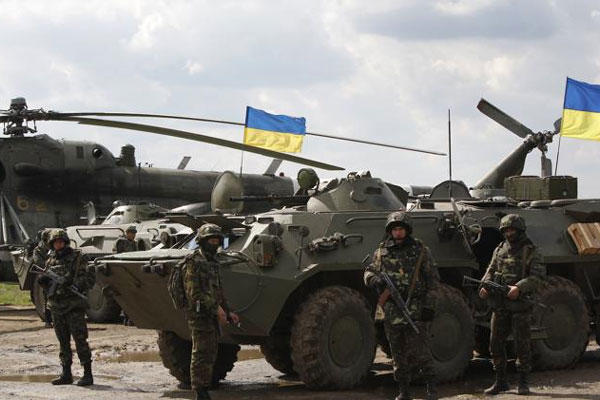A bipartisan group of lawmakers from the Senate Armed Services Committee have called upon the White House to provide lethal weapons to Ukrainian forces to fight off Russian separatist advances into their territory.
"Russia's invasion of the sovereign territory of Ukraine has continued unabated in the face of political and economic sanctions. It is the gravest threat to European security in decades," Sen. John McCain, R-Ariz., SASC Chairman, said Feb. 5. "5,358 people have been killed and 12,235 have been wounded since April 2014. The U.S. and its NATO allies must deter further aggression."
McCain was joined by other Democratic and Republican senators hoping to provide Ukrainian forces with defensive technology such as anti-tank weapons and radar. Some of those in attendance included Sen. Jack Reed, D-R.I., Sen. Lindsey Graham, R-S.C., Sen. Kelly Ayotte, R-N.H., Sen. Bill Nelson, D-Fla., and Sen. Richard Blumenthal, D-Conn., among others.
The strategy is not to enable the Ukrainians to defeat Russian forces in a military conflict but rather raise the consequences of the fighting for Russia in order to move toward a peaceful political settlement, several senators explained.
"Every sovereign nation has the right to defend itself. That is what Ukraine seeks, not American forces to do their nation's fighting. Open once again the arsenal of democracy that has allowed free peoples to defend themselves," McCain said.
Russian leaders such as President Vladimir Putin are accused by many in the international community of providing support to pro-Russian separatists in Ukraine seeking to make military advances.
"Defensive lethal assistance will not allow the Ukrainian military to defeat the Russians in a full-fledged war – but it will raise the risks and costs Russia must incur. It will pierce the venire of the Kremlin's cynical and false narrative that there are no Russian's in Ukraine," McCain said.
Reed said the Obama administration has committed nearly $120 million in military assistance to Ukraine thus far – all in the form of non-lethal aid.
"Ukrainian forces have fought courageously to defend their country. Russia continues to violate commitments and is escalating aggression against Ukraine. They have abandoned any pretense of a cease fire," Reed told reporters. "We should be prepared to help Ukraine defend themselves. Building up Ukraine's ability to defend itself would raise the cost of further Russian aggression."
The U.S. military would not say if they are making plans to send new weapons to Ukraine, but Pentagon officials are monitoring the situation closely.
"We are increasingly concerned by escalation of separatist violence and presence of Russian units near border," said Lt. Col. Vanessa Hillman, a Pentagon spokeswoman. "We are continually assessing our policies to ensure they are responsive, appropriate and calibrated to achieve our objectives. That said, we believe there is no military resolution to the crisis."
Reed added that the message to Ukrainian forces should also clearly emphasize that U.S. combat forces cannot be expected to participate.
Secretary of State John Kerry emphasized the need for a diplomatic solution to the ongoing violence during a visit to Kiev Feb. 5.
"We cannot close our eyes to the tanks that are crossing the border and coming from Russia into Ukraine. We can't close our eyes to Russian fighters in unmarked uniforms crossing the border and leading individual companies of so-called separatists into battle," Kerry said.
Kerry also accused the Russians of not honoring a cease-fire they helped to establish in September of last year.
When it comes to succeeding in achieving an actual ceasefire or diplomatic solutions, McCain spoke to the paradoxical nature of arming the Ukrainians.
Only if the Kremlin knows risks will it seek a political solution," McCain said.
The senators also emphasized that providing lethal arms to Ukrainian forces will send a positive message to U.S. allies nearby who might have concerns about themselves becoming a victim of Russian-backed aggression.
-- Kris Osborn can be reached at kris.osborn@military.com





























